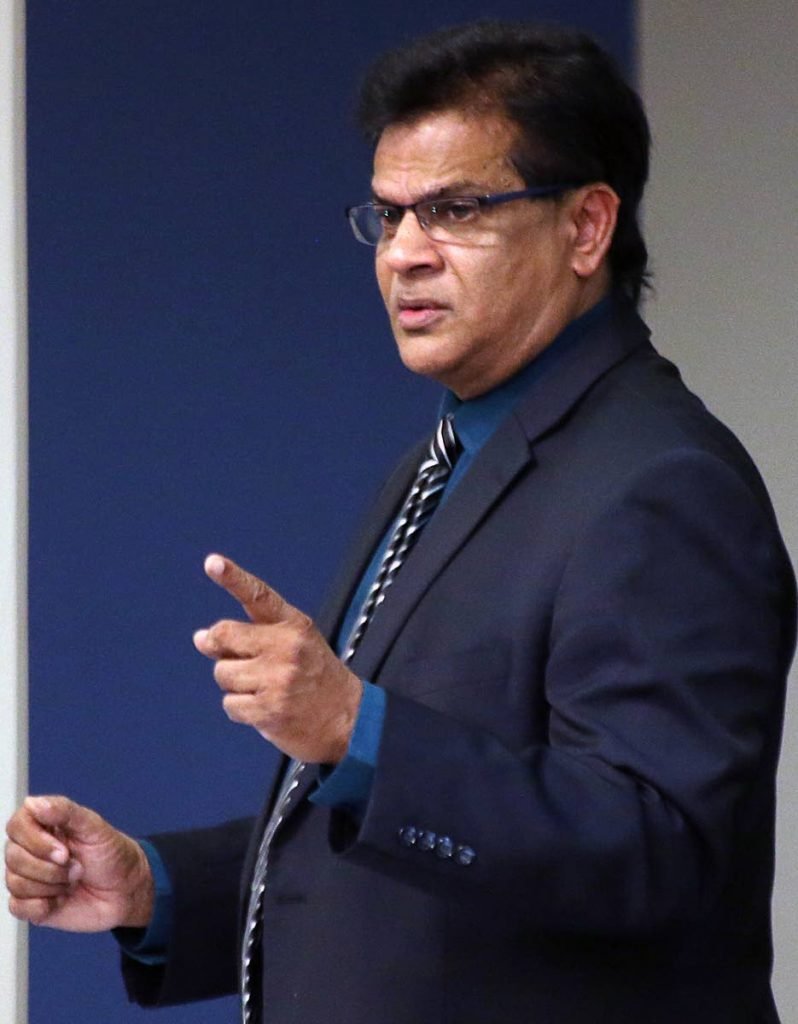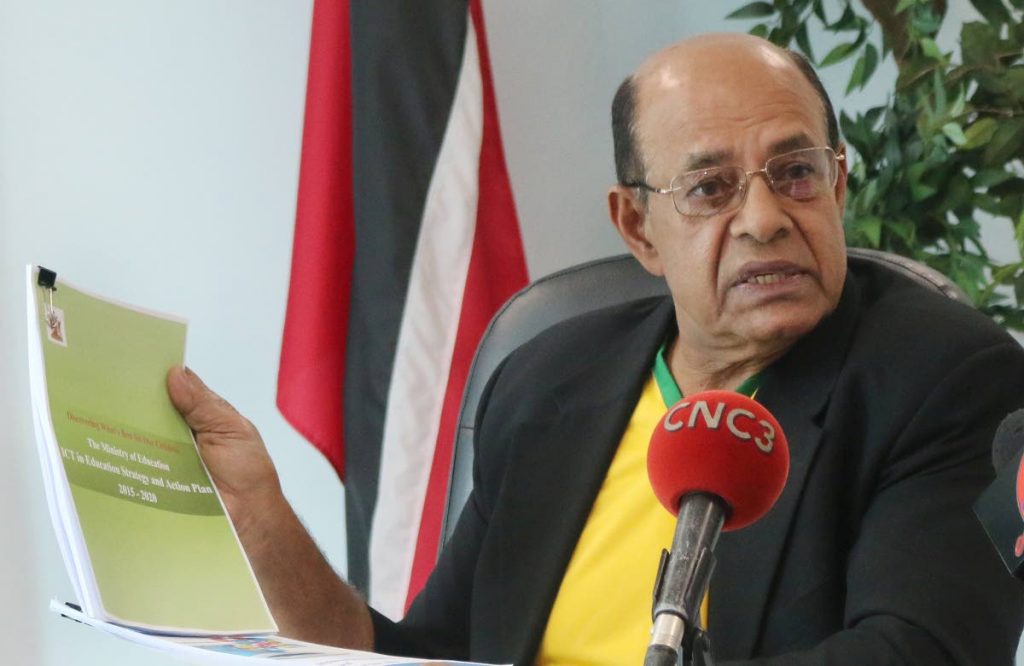Khan: Intersex vs votes

Politicians will not get involved with the issue of intersex and people with ambiguous genitalia because they are afraid of losing the favour and votes of religious people.
That was the claim of former health minister Dr Fuad Khan, who said intersex births has been a public health issue for many years. However, instead of discussing and dealing with it, he said everyone pretends it does not exist because the people of TT, and politicians in particular, are close-minded to anything religious people do not like.
“Everybody is afraid to touch it because they feel they would lose votes. The politicians are the ones who create the law. They create the policy. But the religious people come in and tell them, ‘Don’t touch that. That ain’t good. God say so.’ So you end up now with a set of people who are ostracised.”
Intersex is an umbrella term to cover biological variations where people are born with reproductive or sexual anatomy issues relating to chromosomes, gonads, sex hormones, or genitals, that do not fit the typical definitions of female or male.
Usually, people with the XX chromosomes are female with ovaries, a uterus, vagina, and clitoris; and those with XY chromosomes are male with a scrotum, testicles and a penis. However, there are women with XY chromosomes, men with XX chromosomes, and men with XXY chromosomes.
There were many syndromes and genetic anomalies that cause this. One of the most common in TT was the Swyer syndrome. People with this syndrome have typical female external genitalia (female phenotype) whether they were genetically male (XY) or female (XX) (male or female genotype). However the ovaries or undescended testes are not functional and are usually removed because they often become cancerous. These people are typically raised as female although they would not go through puberty (breast development, menstruation, pubic hair growth) without hormone replacement therapy.
Khan said some doctors or nurses do not do a thorough examination of the newborn.
They would just see a penis and declare it a boy and the child may be registered as such but the parent may return later to say there was also a slit. “That’s why you have, no offence, a lot of people who are supposed to be gay or of the LGBT community, but when you check, quite a few of them may be phenotypically male or female but genetically the other side.”
As a plastic and reconstructive surgeon who, at one time, performed sex reassignment surgeries, Khan said it was quite easy to perform a “clitoris” reduction and create a slit in a scrotum to “create” a female. He said rather than refer the case to a urologist or send for genetic testing, gynaecologists used to “do their own thing,” which was usually the easiest thing to do, and make the child’s genitalia look female.
He said up to a few years ago there were no structures or policies regarding intersex people, but he hopes there are now as TT has more access to genetic testing. However, since people have to pay for it privately, many people still do not bother to do the tests. Khan said when he was health minister he used to send tests via the regional health authorities or the External Patient Programme because there is still no genetic testing in the public sector.
He said genetic testing is usually not done unless something is suspected. Less than a decade ago, Khan said doctors in TT would just choose a sex because genetic testing had to be sent abroad and it was expensive so very few people did it. Now there is a private lab in the country so testing is more accessible but it is expensive.
He explained if a child is genetically male, a surgeon can “close the lips,” or if the child is genetically female, decrease the clitoris. “However, if there are internal testes, you have to try to bring them down and then sew up the labia. Depending on the age you could give the child testosterone shots to do that. But undescended testes have high incidents of cancer so you have to monitor it carefully. If it doesn’t descend, that is one case the testes should be removed and a male genotype could be designated a female phenotype.”

Former education minister, gynaecologist, surgeon and oncologist Dr Tim Gopeesingh confirmed that when he trained with head of Obstetrics and Gynaecology at the Royal Postgraduate Medical School, London University, Professor Sir John Dewhurst, in 1978-81, most paediatric gynaecologists would advise to raise the child as female despite chromosomal makeup mapping.
“The structural features of the young child is easier to convert to female than to male. You can not lengthen the penis and so on. To bring up the child as a male has tremendous disadvantages so generally the paediatric gynaecological surgeon would recommend, more often than not, bringing the child to female and then give estrogen therapy later on in life.”
He said children born with ambiguous genitalia, for example a very small penis, or not well-formed scrotal sac, would be examined and, with the guidance of the “knowledgeable and skilled” gynaecologist, parents would have to determine whether they want to raise their child a male or a female.
He said the decision had to be made early, before the two-year mark, so the child did not have to live with the memory of a gender change which could have psychological effects. “The first problem is not knowing who you are, whether you are male or female, and also the surgery, to have to deal with that post-surgically is very traumatic.”
Dr Marlon Timothy from the office of the director of Women’s Health told Sunday Newsday in an e-mail interview, while there is no official policy in the public health system, an international-best-practice approach from experts in the US and Europe is followed.
He said there are many causes of intersex so each case is examined individually by a specialist team. He said most of the management is done locally, but if special tests are required, those are funded by the government.
“Children born with ambiguous genitalia are not registered until genetic confirmation of their sex is performed. As there are many conditions that cause ambiguous genitalia, apart from the genetic analysis, other blood and radiological investigations are performed to assist in determining the cause of the ambiguous genitalia.
“Once the genotype is identified, the child can be registered but this may be additionally delayed until the cause is also known and after initial consultation with a multi-disciplinary team consisting of an endocrinologist, geneticist, surgeon and neonatologist/paediatrician.”
He said after the cause is identified and treatment starts, most cases “returned to their genetically assigned phenotype.”
However, he said in rare cases, the ambiguous genitalia is associated with additional congenital abnormalities affecting the child’s genito-urinary system. At that point corrective procedures may be performed by local paediatric surgeons or the opinions of international sub-specialist are requested.
Quote: Everybody is afraid to touch it because they feel they would lose votes.---Dr Fuad Khan
The structural features of the young child is easier to convert to female than to male. ---Dr Tim Gopeesingh
Children born with ambiguous genitalia are not registered until genetic confirmation of their sex is performed. ---Dr Marlon Timothy
Put in box: Intersex is an umbrella term to cover biological variations where people are born with reproductive or sexual anatomy issues relating to chromosomes, gonads, sex hormones, or genitals, that do not fit the typical definitions of female or male.

Comments
"Khan: Intersex vs votes"